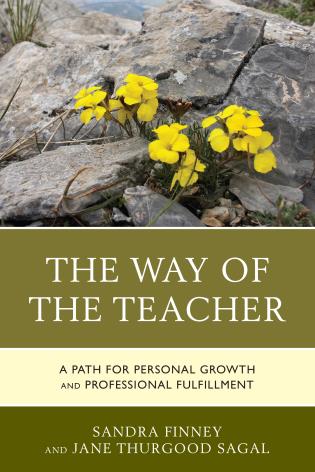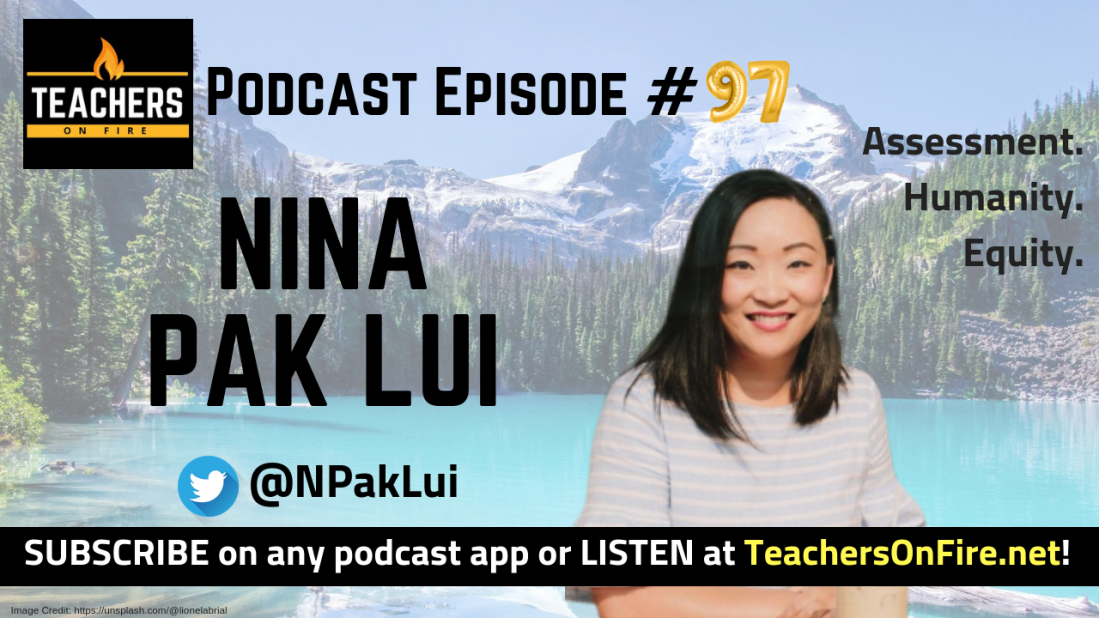Meet Nina Pak Lui
NINA PAK LUI has taught at the middle and high school levels and today she instructs pre-service teachers at the School of Education at Trinity Western University in Langley, BC, Canada.
Nina views teaching as a sacred calling, and she’s dedicated to inspiring and equipping future teachers to be caring, competent, inclusive and reflective. She is passionate about designing and facilitating meaningful learning experiences that intentionally connect theory to practice.
Tensions Between Vision and Reality
A few years ago, Nina was teaching in a high school context when her mental health began to struggle. She experienced a taxing tension between her vision for program ideals and certain systemic constraints that would not allow that vision to come to fruition. It became increasingly difficult to align her values and beliefs with practice, and the emotional distress eventually became too pressing to ignore.
Nina took an extended leave from her position, and the time away was healing and clarifying. With a lot of time for reflection, she stopped blaming external factors and began examining her own internal landscape. She learned to be kinder to herself, show more patience with others, accept the slow rates of institutional change, and recognize that perfectionism is a thief of joy. With lots of love from her support network, she has rested, recalibrated, healed, and now enjoys new optimism and outlook in her current context.
Focusing on Formative Assessment for Learning
Nina regularly talks with her undergrad students about their own assessment journeys. They share about unyielding deadlines, grades being used to punish, no chances to refine or revise, and feedback that only comes at the end of a learning cycle. Although assessment experiences can be positive, the negative experiences seem to come through more often.
Katie White, author of Softening the Edges: Assessment Practices That Honor K-12 Teachers and Learners, writes that “continual intention and active capturing of learning in the moment and making inferences about a learner’s understanding in relation to a goal happens over time.” Dylan Wiliam adds that “for assessment to be primarily embedded in the learning cycle it must remain formative,” and “all activities undertaken by teachers and/or by students provide information to be used as feedback to modify teaching or learning activities in which they are engaged.”
These quotes speak to the ideas that …
- learning happens over time,
- we must practice intentional goal-setting,
- we must allow more times for reflection, and
- we must support more opportunities for revision and additional tries.
For Nina, formative assessment is often about determining readiness: is the learner actually ready to take the next step? Too often, we push learners down a track that ignores their individual needs and progress, which only creates further dissonance and deficits in their learning journeys. By being more flexible and creating personalized learning experiences, we create more on-ramps for learners and ensure that every student remains on a track to growth.
Summative assessments have a place in classrooms, Nina says, as long as they are actually used as a tool for learning, celebrate growth, and close the door for further learning as seldom as possible. Summative assessments should look like rich performance tasks that demonstrate the complete learning standards that the learner is aiming for. When using summative assessments, it’s critical to carefully consider the best type of summative assessment to be used and ensure that the learning standards can be fully demonstrated.
Why Should We Assess Students At All?
So why assess? Katie White says that assessment is something that we are always doing, and it’s an essential process to support the human. Achievement in school is not about doing work to accumulate points and letter grades. Instead, school should be a place of learning and becoming. “I want my students to know that they can make mistakes, that they can try again to correct their mistakes and improve,” Nina says.
Questions to Ask Ourselves Around Assessment
- Are we here to ensure that students are taught or that students learn?
- Are we here to measure only past learning or support future learning?
- Is our work about building walls and documenting who climbs over them, or making sure our learners have the tools and supports to push through the barriers that are in front of them?
When we identify and address barriers to learning through greater access, equity, and inclusion, our learners will be more successful.
How to Best Serve Pre-Service Teachers
When it comes to pre-service teachers today, Nina points out that their needs haven’t changed too much over the last twenty years. They still need the safety and support to try new ideas, encouragement to take risks, and the freedom to think outside the box. They also need quality mentors and supportive partnerships in the field, because sometimes what they see and experience in classrooms does not align with the principles they are learning in their classrooms.
On that note, education programs must work hard to intentionally connect course work to field work, theory to practice. Pre-service teachers and inexperienced teachers are having to adjust to a rapidly changing landscape and movements, so we must give them the confidence to remain lifelong learners – professional learners – that aim not to have it all figured out at once but instead adopt a posture of continuous learning and growth throughout our careers.
Addressing Gaps in Equity and Inclusion in Our Schools
When it comes to equity, Nina says, she starts by looking at access. Does every student have equal opportunity and access to the learning experiences? It’s an obvious step, but school faculties and leaders must do a better job of representing the voices and cultures in their school populations, says Nina.
What’s Setting Nina on 🔥 in Education Today
Nina has become obsessed with collaborative inquiry and the Spiral of Inquiry, created by Linda Kaser and Judy Halbert. The spiral gives voice, choice, and agency to educators and the means to go on learning journeys as whole communities.
Nina gets ignited by other education soulmates, including academics like Jenn Skelding, Christine Younghusband, and Gillian Judson, co-author of Imagination and the Engaged Learner: Cognitive Tools for the Classroom. These three and others constantly recharge her passion for education and the changing paradigms in assessment.
One thing Nina has definitely missed since leaving the classroom are the voices of parents, and she wants to find ways to include their voices in more education conversations.
Nina’s Professional Goals
On the horizon, Nina is also passionate about taking on another new step of learning by way of academic research. In particular, she wants to learn more about teacher education program development and assessment for learning, including its integration at the secondary and post-secondary levels.
The two words that summarize Nina’s goals for this year are bravery and courage. Nina has felt challenged in this last year to really lean into transparency about her professional learning journey. On top of starting new research, she’s also committing to sharing her learning on her blog and modeling vulnerability for her students. She’s been asking her students to blog about their learning, and after reading hundreds of their entries, she recognized that it was time for her to walk the walk and start sharing her own journey as well. Creating and designing her blog and formulating her first posts has already given her more empathy for her students and understanding of the learning challenges they face.
Personal Passions That Keep Her Inner Fire Burning
Nina’s chief passion and source of rejuvenation away from the university is her family. She’s a wife and mom to two kids, and spending time with them is her greatest joy. Calling her kids her greatest teachers, she says they help her come alive and continually remind her of what it means to be human.
She’s also enjoying the insights shared by authors like Ken Shigematsu, Henri Nouwen, and Jean Vanier regarding the nature of life and humanity, and she embraced opportunities this summer to unplug from the digital and become fully immersed in nature.
A Productivity Hack
Nina uses the Wunderlist app to track to-do items for her courses or profound questions asked by her kids. It helps keep her stay organized and on track.
Voices & Resources That Inspire Nina’s Thinking
Over on Twitter, Nina recommends following @KatieWhite426, author of Softening the Edges. Katie is active on Twitter and hosts the #AtAssessment chat which takes place every other Tuesday night.
An edtech tool that facilitates voice, engagement, and learning in her university classes is Socrative. Follow Socrative on Twitter @Socrative.
 Nina’s book recommendation is The Way of the Teacher: A Path for Personal Growth and Professional Fulfillment by Dr. Sandra Finney and Jane Thurgood Sagal. This book works on several levels, Nina says. It offers practical suggestions for our professional work but also offers guidance about how to work in human and sustainable ways that rekindle our love and joy for teaching.
Nina’s book recommendation is The Way of the Teacher: A Path for Personal Growth and Professional Fulfillment by Dr. Sandra Finney and Jane Thurgood Sagal. This book works on several levels, Nina says. It offers practical suggestions for our professional work but also offers guidance about how to work in human and sustainable ways that rekindle our love and joy for teaching.
One podcast that Nina enjoys is called On Being with Krista Tippett. What does it mean to be human? How do we want to live? Who will we be to each other? These are the questions that guide their conversations.
Two shows that Nina has been watching on Netflix are The Crown and Queer Eye. More than just a fashion show, Nina appreciates how the hosts of Queer Eye go beyond fashion to meet people wherever they are in their lives.
We sign off on this conversation, and Nina offers the best ways to connect with her online. See below for details!
Connect with Nina:
- On Twitter at @NPakLui
- On her blog at http://ninapaklui.com/
Sponsoring This Episode: Classtime
This episode is brought to you by Classtime.com, an assessment platform that delivers learning insights, giving you more time to teach.
Classtime.com helps you gain immediate visibility of your students’ learning progress, build engaging lessons, share with other teachers, and create your own tech-enabled questions to complement your lesson plans. Classtime.com also helps you engage all students with collaborative challenges & puzzles that make fun an integral part of the learning experience.
See what Classtime can do for your learners, and start your free trial at Classtime.com today!
Song Track Credits
- Intro: Stand Up (by Mike Cosmo — license purchased at https://taketones.com/)
- Voxer Clip Background: Bobby Drake by Benjamin Banger (@BenJaminBanger on Instagram, website at http://smarturl.it/hjfi20)
- Outtro: Bluntedsesh4 (by Tha Silent Partner, courtesy of FreeMusicArchive.org)
